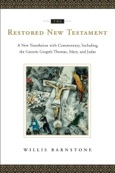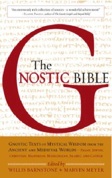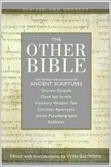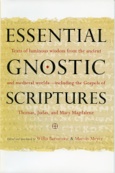-
 The Other Bible: Jewish Pseudepigrapha, Christian Apocrypha, Gnostic Scriptures, Kabbalah, Dead Sea Scrolls, Edited with Introductions, San Francisco: Harper San Francisco, 1984. Sumgyojin Songso (translation of The Other Bible into Korean), Translation by Yi Tong-jin, Soul, Korea: Munhak Such’op, 1994, 2 vol; 2nd expanded ed., 3 volumes, 2005.
The Other Bible: Jewish Pseudepigrapha, Christian Apocrypha, Gnostic Scriptures, Kabbalah, Dead Sea Scrolls, Edited with Introductions, San Francisco: Harper San Francisco, 1984. Sumgyojin Songso (translation of The Other Bible into Korean), Translation by Yi Tong-jin, Soul, Korea: Munhak Such’op, 1994, 2 vol; 2nd expanded ed., 3 volumes, 2005.
-
 The Apocalypse: Book of Revelation, A New Translation with Introduction, New York: New Directions, 2000.
The Apocalypse: Book of Revelation, A New Translation with Introduction, New York: New Directions, 2000.
-
 The Art of Worldly Wisdom, by Gracian Baltazar, Edited and with Introduction by Willis Barnstone and with Translation by J. Joseph Jacobs and Willis Barnstone, Boston: Shambhala Classics, 2000.
The Art of Worldly Wisdom, by Gracian Baltazar, Edited and with Introduction by Willis Barnstone and with Translation by J. Joseph Jacobs and Willis Barnstone, Boston: Shambhala Classics, 2000.
-
 The Gnostic Bible: Gnostic Texts of Mystical Wisdom from the Ancient and Medieval Worlds---Pagan, Jewish, Christian, Mandaean, Islamic, and Cathar, (edited by Willis Barnstone and Marvin Meyer), Boston: Shambhala Books, 2003; The Gnostic Bible: Revised and Expanded, Including the Gospel of Judas, (edited by Willis Barnstone and Marvin Meyer), Boston: Shambhala Books, 2009.
The Gnostic Bible: Gnostic Texts of Mystical Wisdom from the Ancient and Medieval Worlds---Pagan, Jewish, Christian, Mandaean, Islamic, and Cathar, (edited by Willis Barnstone and Marvin Meyer), Boston: Shambhala Books, 2003; The Gnostic Bible: Revised and Expanded, Including the Gospel of Judas, (edited by Willis Barnstone and Marvin Meyer), Boston: Shambhala Books, 2009.
-
 The Restored New Testament Including The Gnostic Gospels of Thomas, Mary, and Judas, Newly Translated from the Greek and Informed by Semitic Sources, New York/London: W.W. Norton, 2009.
The Restored New Testament Including The Gnostic Gospels of Thomas, Mary, and Judas, Newly Translated from the Greek and Informed by Semitic Sources, New York/London: W.W. Norton, 2009.
Biblical Studies

Available
On Gnosticism:
The Inner Light of Gnosis: A Historical Meditation
Willis Barnstone
Excerpted from Essential Gnostic Scriptures
The people we have come to call gnostics were passionate advocated of the view that salvation comes through knowledge and personal experience, and their pasion shines through i the remarkable body of writings they produced over a period of more than a millennium an a half.
The specific origin of gnosticism is unknown--and it may be unknowable. It is not unknown because it came from nowhere and nothing. Indeed we know approximately when and where this dualistic movement of a god of light spirit and a god of dark matter began in antiquity, and also the names of the possible sources. But there are deep an conflicting theses, ancient and modern, about the relevance of these sources to the origin of the widespread and enduring sect. The story of the origin of most of the world’s spiritual movements--Daoism, Hinduism, Buddhism, Zoroastrianism, and Judaism--is blurred in possibility, and reaches us more as legend than history. Even highly documented early Christianity, born of two essential Jewish scriptures, the Old and New Testament gospels, is steeped in the legends of the New Testament gospels, its core source, that disguise rather than reveal historical probability. So the word is still out on gnosticism. It has backers who speak of elements of Jewish, Christian, Zoroastrian, Buddhist, Platonic, Alexandrian Neoplatonic and Egyptian hermetic ancestry...
Gnosis meaning “knowledge,” becomes the quest of those competing sects, deriving from diverse sources, who have been called gnostics. When, through Plato, Socrates declares, “Know yourself,” one tenet of gnosticism was born. But much earlier, in the Hebrew Bible,, Eve chose the fruit of gnosis from the tree and is treated thereafter--as is woman--as the flawed, outsider heretic in the Judeo-Christian-Islamic family of religions. Conversely, among the gnostics she is praised for her courage to choose knowledge rather than innocence (ignorance) and to defy the authority of the creator gog of earth and people, who guards knowledge as his own. Eve is the hero of the light and the Promethean liberator from god’s tyrannical authority. In Genesis and in later gnostic myth (such as the Origin of the World and the Reality of the Rulers), Eve is the mythical mother of gnosticism...
(Excerpted from Essential Gnostic Scriptures)
© 2010-2015 Willis Barnstone. All Rights Reserved
Site by Barely Sober Media, LLC
Phoenix | Hollywood, CA
Selected Bibliography





